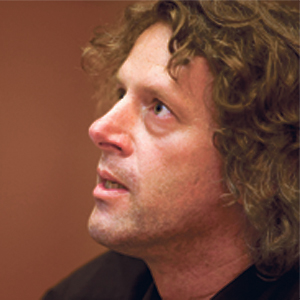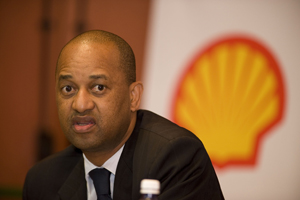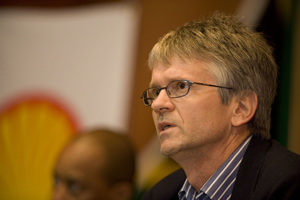Troubled electricity supplier Eskom will have a sidekick to oversee renewable energy if new legislation is passed.
Ompi Aphane, who works for the national department of energy, said that the legislation ‘will be introduced to Parliament early next yearâ€.
He was one of four panellists at the Mail & Guardian‘s Critical Thinking Forum, hosted by Shell recently. It was the fourth public debate on local energy issues in this series.
Aphane said the state-owned enterprise, Eskom, had become a ‘problem†and should not have a ‘stranglehold†on national electricity supply. Renewable energy would be developed under a separate parastatal, said Aphane.
The debate this week, titled ‘SA’s optimal energy mix: how do we diversify the energy base?â€, was hosted by Judge Dennis Davis from the Competition Appeal Court. It was held at the Gateway to Robben Island at the V&A Waterfront in Cape Town.
The four panellists responding to the topic shared insider views from academic, government and technological contexts.
Solar energy was discussed as a viable option but so was nuclear energy — in light of the climate crisis caused by carbon emissions — to keep South Africa’s lights up and running.

Kobus Meiring, co-founder of Optimal Energy and former project manager of the Southern African Large Telescope:
‘Technology must be part of energy conversation. These are energy issues that we need to address right now. It can’t wait. We need to discuss energy generation, storage and use.
‘Energy generated from coal is more than sufficient for South Africa. But if we could store all the energy that we don’t use at night we could solve energy problems for decades.
‘We also have to deal with pollution. Transport relies on fossil fuels and that makes up 30% of pollution in cities.
People say countries in Europe have good public transport systems but 75% of city transport in Europe is still by car. As long as cars are the main transport form and we use fossil fuels, we have not solved the energy problem.
‘By 2020 there will be six million electric vehicles in the world. That’s 10% of the car market in the world. If you buy a normal car in Denmark today, there’s 180% tax to be paid on it. If you buy an electric car in Denmark, there’s zero tax on it.
‘In Western Europe there are massive incentives legislated for people to buy electric cars. California in the United States has been a frontrunner on this.
In China last year 14-million electric scooters were sold. There’s a tidal wave afoot that we can be part of or washed away by. It’s coming and we’re not going to stop it.
‘In South Africa, from a market point of view, there are a lot of people talking green but not a lot who are willing to put money into it. It’s an amazing country to start something new, but not necessarily to sell something green.
‘There are seven million cars on our roads. We could make all of them electric because there would be enough energy capacity on the grid at night to charge them.
That’s the size of the energy storage that we’re sitting with. There’s a huge amount of waste energy on our system and the emissions are continuing. Other governments started a while ago on the green issues. We are catching up.â€

Energy supply requires an integrated approach, says Professor Alan Brent, from the school of public management and planning at Stellenbosch University:
‘One of the big problems in our energy debate is that the different stakeholders are dispersed. We are going to have to work in an integrated manner.
‘Solar energy as an option needs an integrated policy. We can’t go into solar energy if we don’t have the industry to support it.
You also can’t ask the same person selling you electricity to reduce your electricity use. It’s not in Eskom’s interest that you put a solar water geyser on your house. They want to sell electricity to you.
‘We also need legislation. This could mean that if you make modifications to your house, your building plans should be approved on condition that you have a solar water heater.
‘There are so many affluent parts of society where you’re not allowed to put a solar water heater on your roof because it’s said that the aesthetics are not right. We need to question these things.
‘A total solution includes nuclear energy in some ways. There are issues to tackle in the nuclear value chain but there are ways to address them and there are bodies that deal with them. Nuclear energy will always be controversial.
‘Consumers also need to push for green energy. People will start jumping when we have a carbon tax. That would drive consumer incentive.â€

Ompi Aphane works for the national department of energy’s policy development in the electrical sector:
‘Eskom is the problem and a clean energy parastatal is needed now. South Africa has about 400 years worth of coal reserves that we can exploit.
We also have one of the highest solar radiation levels in the world that we are not exploiting. And 24% of our population still doesn’t have access to electricity or any other form of energy.
‘There is no doubt that our electricity supply at the moment is not sustainable. We want to build more power stations but there are international and domestic pressures against it.
‘If we keep exporting a product that is not sensitive to global climate issues we may find ourselves high and dry.
‘We need institutional reform. We have to break Eskom’s stranglehold on the electricity sector. We need alternative suppliers.
We need to be able to take advantage of all the other opportunities in South Africa and neighbouring countries related to clean energy.
‘There are also tax incentives that government must put in place so that for every unit of energy that you save you should get a tax rebate.
‘There is legislation on track that aims to form an independent system operator. This will be proposed in new legislation that will be introduced to Parliament early next year.
‘Eskom will still be a very significant player. We want to have another entity created that would look after clean energy. It would be a buyer of clean energy. We are all on tenterhooks because the problem is with Eskom.â€

Professor Harald Winkler, from the Energy Research Centre at the University of Cape Town:
‘Investing in renewable energy will outshine coal-based energy. We hear that South Africa is a coal-based energy economy but we are equally a solar-based energy economy.
Coal is going to be sub-optimal. If we want to remain buyers of energy in the future then let’s continue investing in coal.
‘We need to redefine our competitive advantage in terms of climatefriendly technology rather than cheap but dirty electricity.
And if we are seriously going to talk about an optimal energy mix it would be optimal to have someone in charge of the energy in South Africa.
‘In the next five years we need legislation that will reduce the energy demand before we talk about supply.
We need to consider using less energy. We also need to start right now to invest aggressively in renewable energy.
‘The really massive resource, bigger than our coal resource, is solar power. We need to build an industry around that.
‘From a climate point of view, nuclear energy has to be part of the country’s energy mix but it has to be done gradually because there are serious security issues and risks associated with it. But nuclear energy options have been on hold because they are expensive.
‘We must invest in renewable energy. It will be cheaper than coal in the long term. It’s also about making investments now that put us in the right market position to compete with other countries.â€